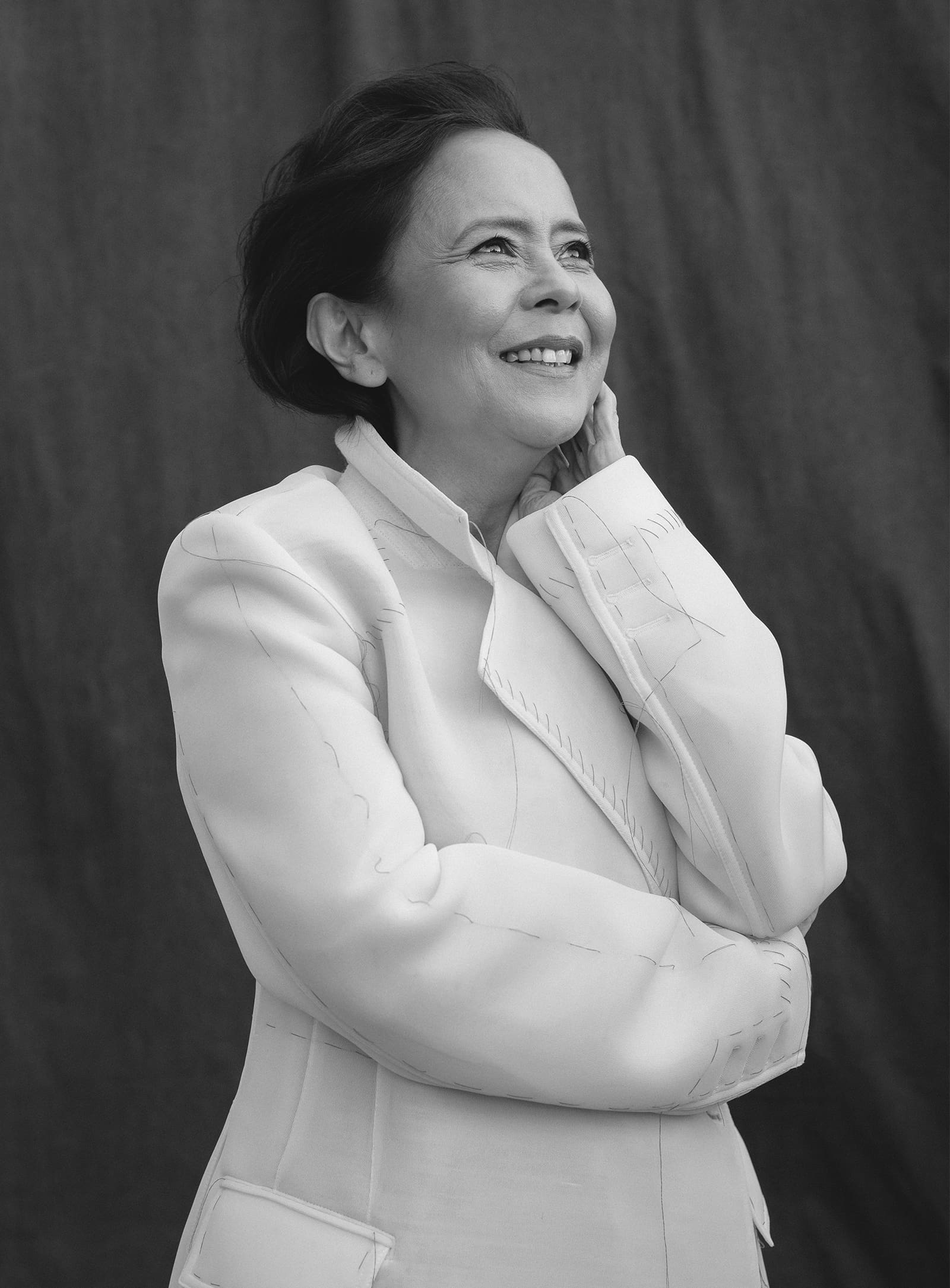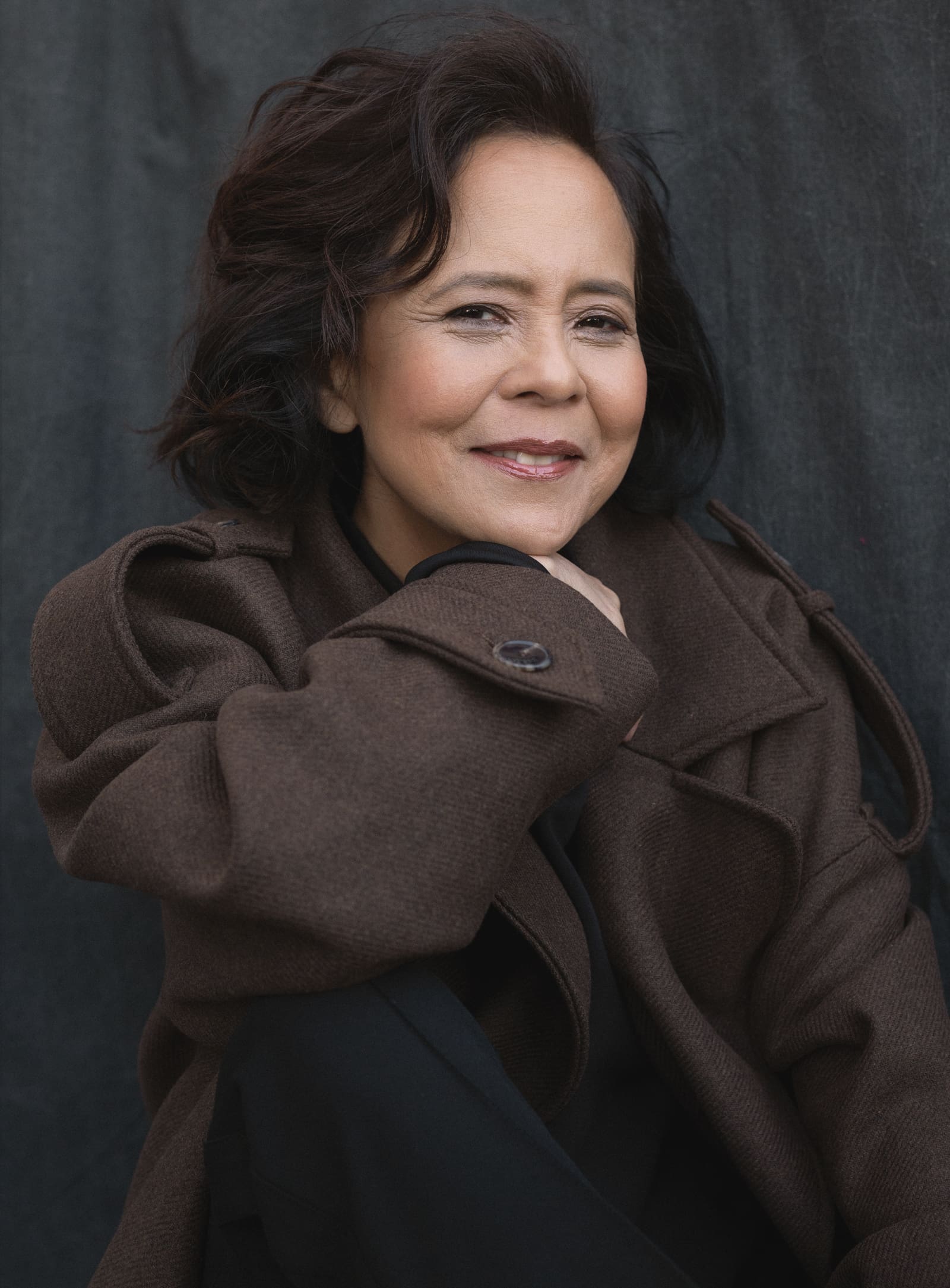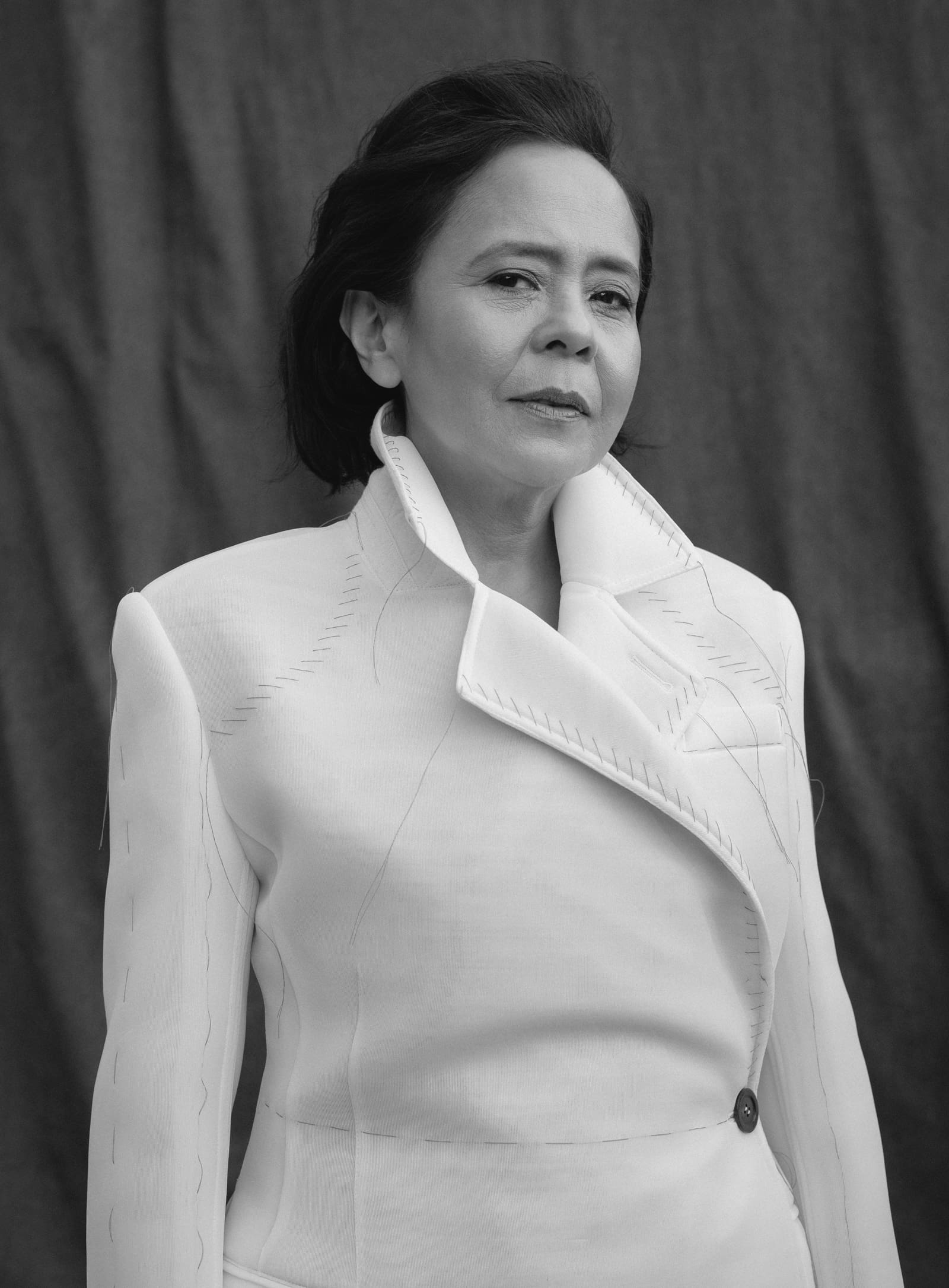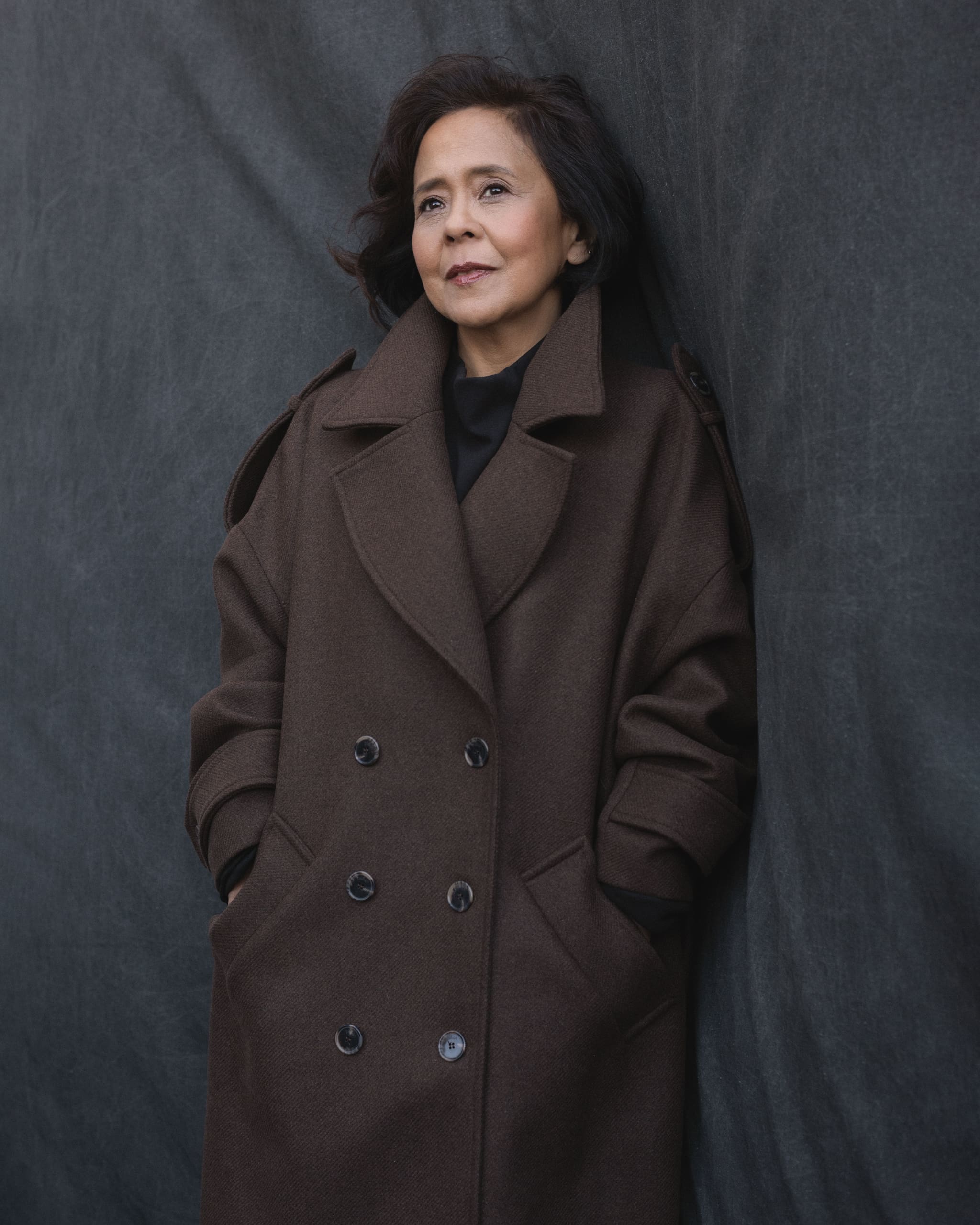BA+SH coat, MAISON ALAÏA black turtleneck, THEORY pants, BOTTEGA VENETA loafers. Raen Badua
As Oscar season kicks off, Dolly de Leon speaks with Bianca Moran Parkes about her journeywoman career, how she keeps sane, and the director-actor dynamic.
Dolly de Leon isn’t a household name. Yet.
Ever since Triangle of Sadness triumphed at the Cannes Film Festival, with director Ruben Östlund winning his second Palme d’Or, only one name has been on the lips of Hollywood’s Oscar whisperers, talent agents, and actors. Featured among an international ensemble headlined by Woody Harrelson, de Leon’s breakout role as Abigail has placed her in the race to become the Philippines’ first actor to ever receive an Oscar nomination in its 93-year history.
Her path to the brink of Oscar stardom hasn’t come easily or quickly. For over 30 years, she’s maintained a career in the Philippines, acting in commercials, stage plays, soap operas, and local films, honing her craft while never achieving the success she so obviously warranted. But as is the case with this most fickle industry, one role can change everything.
De Leon took a self-proclaimed “bad auditioner” and showed up to the Triangle of Sadness audition with nothing to lose. The grit and determination that she’d built over decades were tailor-made for the role of Abigail, a no-nonsense OFW (Overseas Filipino Worker) who puts the rich in their place. She was destined for this role, one that represents minorities and underdogs all over the world. Not only does Dolly recognize her opportunity as an actor but also her place as an ambassador for the country and people she loves so much. Manila will always be home.
It’s an unseasonably windy day in Los Angeles when I meet with Dolly at the aptly named London Hotel. We move from the hotel rooftop to the balcony for today’s shoot. She confidently owns the camera, all while making the crew laugh and feel at home. The brisk chill in the Angeleno air doesn’t dampen the spring in her step. Playful, honest, wise, and sincere, Dolly exudes warmth. And amid the organized chaos, she makes it a point to greet me with open arms as soon as I walk in. I feel like I’m with family. There’s a humanity that she brings to the day.

BIANCA MORAN PARKES: Walk us through what your experience on the international stage has been like so far.
DOLLY DE LEON: Everything’s just starting to sink in recently, but it’s really been strange because I’m not used to people giving me any kind of attention (laughs) but it’s been fun too. I think that the best part of this whole thing is meeting people, meeting like-minded people who love filmmaking, who love acting. And that, to me, it’s always very refreshing to learn from other people and to hear people from different cultures and ethnicities talk, talk about their passion and their jobs. So lately it’s been a lot of fun.
The cast in the film is also really diverse. So many different perspectives. What was it like premiering Triangle of Sadness at the Cannes Film Festival?
It was like an out-of-body experience really. I didn’t feel like my head was on right because for the first time, I attended a red carpet. So it was my first red carpet event in France, in Cannes, knowing that the audience has a very particular taste and these are cinephiles who really love film. So it was intimidating—flash photography everywhere. And then I was going to watch the film for the first time. I had never seen the film before Cannes—you know, Linda Blair in The Exorcist? When her head goes around? That’s how I felt it. Like my head was just going around my shoulders.
How did you become an actor?
My first experience with acting was when I was in the fourth grade. We were made to act in a scene where we were siblings and our other classmate was our mom. We were supposed to grieve over her death, so we were acting it out. And when I was doing the scene, and I don’t know why, maybe because when you’re a child, your imagination really runs away with you—I was really feeling it and it felt so real to me that I was really feeling the emotion. I was hooked after that. I was just [like], “what is this feeling?” That to be able to just be free to express what you feel inside and not having to worry about what other people think because it’s my truth, of course, at that time I didn’t know about characters.
So to me it was my truth. And after that, I started doing commercials in the Philippines, and it got serious when I took arts in college. Something I thought that I could actually make a living out of. But I did encounter Ariel Ureta, a celebrity in the Philippines, who was the boyfriend of my cousin who would come to the house and visit us. And then he told me that Niño Muhlach, a very famous child actor at the time, would need a female playmate. So he asked me if I wanted to be an actress, and because I was so shy, and I still am actually, I didn’t want to. So I can’t say that’s one of my biggest regrets because I probably would’ve been a totally different person. But it’s just funny thinking that I could have started really young, professionally—but no, I just chose to have fun with it. And that’s my first love, that’s my passion—doing theater and sinking my teeth into acting and really discovering the truth of it, and how to go about it, how to discover characters.

What was production like, specifically working on a beach? What is your favorite memory from production?
Working in production in Greece, I would say was probably the best time I had in my entire life. It was so much fun because I love the beach. It’s my favorite place on earth, so I was in heaven. And they took care of us very well.
I was terrified every day coming onto set because I knew that what we were doing was very special and it was very important. And I know Ruben puts a lot of passion into everything he does. His film process is very, I wouldn’t say stringent, but he abides by certain rules that are unspoken. But you kind of get the gist of it. He gives everyone the opportunity to explore, but at the same time, he watches us very carefully to make sure we’re always on the right path and not veering away from the truth. I think I really grew as a person and as an actor.
It also reached a point where I got so homesick because I really felt like we were on an island, stuck on an island shooting, far away from my family speaking English the whole time for two months, for six weeks straight. And that really does something to my brain, when I’m not speaking Filipino, which is my native tongue. So I would talk to my kids constantly just to keep me sane and to keep speaking the language. And it reached the point where I was listening to OPM. OPM is Original Pilipino Music and it makes me so happy to listen to OPM.
It was like you were all castaways from different parts of the world.
Yes. But we would also lean on each other for support. So it was a very safe space to be at with them.
What was it like working with Ruben?
I think Ruben is a, well I can’t speak for all actors, but definitely he’s an actor’s director, as far as my experience with him is concerned. He really gave all of us plenty of room to explore and his favorite word was investigate, “Let’s investigate the scene.” So we’re always finding other ways to do the scene, finding maybe better ways to do everything. He really challenged me as an actor, pushing me to my limit to see how far I can go or how much I can do. But at the same time, guiding us and making sure that we’re still on the path of truth.
And I felt safe with him all the time because I knew that he was always looking out, not just for his baby or his product, but his people. He’s a very human-centric kind of director, he looks out for us as well. So it was really rewarding to work with him. And I’m not the type of actor who would look at the monitor after every take because I feel that that gets in the way of delivering an organic performance, but with him… at the end of the day I would, I’d see it, and I’d say, “are you choosing that take? I like the other one better.” And we’d talk about why, and he’d say, “yeah, but this may be better.” So sometimes you reach a compromise, and to me that’s valuable in a working relationship to give the actor freedom to really explore and discover things about themselves, but at the same time being loyal to the material, which is the script.
That’s cool.
Yes. In so many ways. That’s why when we won the Palme d’Or, I felt like we were all winners because we were all part of that whole process. So it felt like the award was not just his, but it was ours.
In looking at photos of Cannes, you could sense that. How did you, the cast, and the crew approach your character’s captain role in the film on and off camera? Did you interact with the cast and crew in a captain-like capacity?
No, I did not act with a captain-like capacity. Nothing against method actors, but I am not a method actor. I really believe that part of the creative process is building relationships with your co-workers. And I’m not just talking about the actors, but the crew, especially the crew. They’re really the most tired because they don’t get to have down times, they don’t get to rest because while the scene is running, they’re setting up for the next shot. I really believe that the working environment is very essential to coming up with really exceptional work because it translates on screen and a lot of people have told me that our cast has really good chemistry.
And I think that’s because behind the scenes we’re really authentic. We really love each other and we’re all supportive of each other. Even when I say that line, which everyone laughs at in all the screenings, “On the yacht, toilet manager” and “Here, captain,” people laugh at that all the time. But I am actually like the exact opposite of Abigail when it comes to how I talk to people or deal with people, but I can be fierce like her too if I have to be.

What drew you to the character of Abigail, and the themes of class differences and people’s true worth in the film?
What really drew me to Abigail is the fact that she is an OFW. I’ve been exposed to that world at a very young age. In the ‘80s, it was Saudi Arabia where people worked. It was usually the men who left home to work abroad so that they could send money or be better breadwinners out of the country to their family. Then later on, the women also started leaving. And to me that really spoke volumes of how precious Abigail is. She’s a woman, first of all, a Filipina or maybe let’s say if she’s not Filipino, she’s a minority, not very well educated but has her own intelligence, and she’s also a migrant. So all those elements, if you put them together, is like a recipe for someone who is just hungry for love and attention and power and self-worth and respect. So that’s really what drew me to Abigail.
And what made it even more special was how Ruben wrote her from “nothing to something.” And to me it’s very important for the role that we play to have an arc or a journey. Abigail had that very special arc and Ruben wrote her so beautifully, and that’s really what drew me to her. The whole script actually. The film is filled with twists and turns—“when is it going to end?” There’s always a turning point in the film. And what I love about Ruben is he doesn’t care about any of that. To him, it’s not about the twists. It’s not about a transformation that happens. It’s about what the characters go through before that transformation.
Ruben must’ve had a Filipino actor in mind as they sent the casting director to the Philippines. Did you teach him about Philippine culture? Did he know anything about OFWs?
He didn’t know it the way we know it. He knew that we were all over the globe working, but he didn’t know the aspects of it, like leaving your family behind. He thought that their families are with them living in that country, but no, their families are still in Manila and they’re alone in that country living with strangers. He also didn’t know that the reason why they leave is because they need to find better opportunities abroad. And in Abigail’s case, she was not a breadwinner. She was just looking out for herself. So that was another aspect that we also discussed. I had to talk to him about why Abigail makes certain choices in the film, why she chooses to go left rather than right. And all of that has to do with her background as a Filipino worker abroad. So those were the little things that we discussed, Ruben and I, but we didn’t really go in depth because I’m a firm believer that the actor has to keep certain secrets away from the filmmaker, from the director because that makes for a more interesting dynamic. And the director is caught off guard and is surprised by a performance for months and they don’t know why. And that’s the secret that an actor keeps.
Do you have any favorite lines from the film?
My favorite moment in the film is when the characters are just using their faces to express their thoughts when the eyes are being used or when the face is being used. As far as lines are concerned? You know what, maybe “I can make you my assistant” by Yaya. That would probably be my favorite line because that triggers something in the scene.
A version of this article appeared in Vogue Philippines’ December-January 2023 Issue, available for purchase now.
Photography: Raen Badua, Stylist: Tor Matthey, Hair & Makeup: Carolina Yasukawa, Producer: Anz Hizon, Talent PR: Claire Timmons, Bianca Parkes, Adam Kersh, Photographer’s Assistant: Miles Caliboso. Shot on location at The London West Hollywood at Beverly Hills
